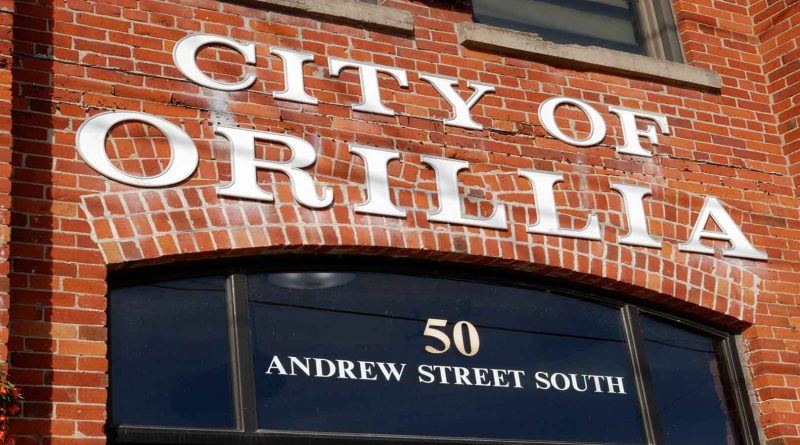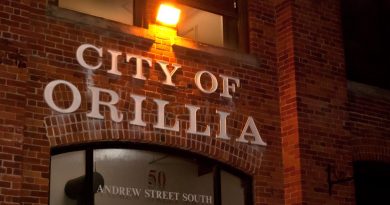Council Preview
By John Swartz
Monday’s Orillia council committee meeting starts early at 2 p.m. as a trial for the rest of the year. The thinking is it will provide people a better chance to attend meetings, whether as spectators or to present reports.
After the committee meeting ends there is a special meeting of council regarding the security bond the City wants from Building Hope for the construction of a new soup kitchen and housing on Queens Street.
This issue was put over from a meeting at the beginning of May. Building Hope asked the City to waive the security charge of $636,000 because they don’t have cash on hand to cover it. They do have $11 million of the $14 million needed to construct, but the money comes from various grants and is only released in stages as construction milestones are met.
Mike Unwin, the chair of Building Hope’s building and design committee, said in a letter to council because the City and the County of Simcoe have interests in the Queen Street property and CMHC has, as a result of their grant to the project, in interest in the existing Lighthouse Soup Kitchen on Peter Street, those holdings cannot be used for a letter of credit.
He further states the contractor getting the job will have to put up a $5 million performance bond, which is greater than the amount the City wants secured. Unwin said the only available vehicle Building Hope has is to put of some of their cash on hand, $200,000, for the necessary letter of credit.
On the City side, the director of development services, Ian Sugden, said maybe it can work, if the $200,000 offered is held to the completion of the whole project. Normally a contractor/developer would get some of a security released as certain portions of construction are completed and engineering signs off. In this case that wouldn’t happen.
Sugden said the primary concern for a municipality is there is something to protect neighbouring property owners and the municipality as connections to services are made (which happens early in the building process). Sugden estimates that portion of the security to be $120,000.
Half of the original amount was to guarantee landscaping would be done to standard. Sugden notes the amount of landscaping intended is much greater than would normally be done and a significant amount of the cost of the work is expected to be provided ‘in kind’ to Building Hope. The permits area applied for according to cost estimates and security amounts formulated from that, since there is effectively no cost to some of the landscaping the bottom line is the security asked for is higher than another project might incur.
Sugden said an estimate of what the City would require a developer to do for sodding, planting trees and shrubs for soil stabilization and buffering to negihbouring properties would be approximately $70,000.
Based on those factors, he concludes $200,000 would be enough to provide security against issues that might arise provided it is held until the project is completed. What is interesting is landscaping securities are typically held for one year beyond the ‘open and ready for business’ part passes because if any trees or bushes don’t survive a winter from re-planting, it will be known in that time frame.
Committee Agenda Highlights
During the committee meeting council will have reports on a couple items relating to environment initiatives. Jeannine Hutty, who presented a project to have Orillia become a Bee City at the Sunshine Awards a few weeks ago, has asked council to adopt a resolution to apply for designation as a Bee City with the Bee City Canada organization. She’d also like some staff support for the local committee and to have the committee included in the City’s insurance coverage. Staff are recommending to proceed and to appoint the community garden coordinator oversee the local committee.
Next, Kids for Turtles, is asking for relief regarding their $2,000 annual hydro bill which they pay for the use of a building at Tudhope Park where they run programs from. They only use the building during the summer because it’s not winterized and is only useful for storage the rest of the year. Staff’s first option to council is to receive the report, which means no action. Staff says it is policy to have user groups pay fees to use City-owned office space and they don’t want to set a precedent.
Youth Senate
A follow up report from the director of youth opportunities, Kevin Gangloff, is getting to council after being originally requested in February 2017. At the time, councillor Jeff Clarke wanted to know the feasibility of formally establishing a youth council. The YOC did report back in 2017 and was directed to prepare the marching orders and necessary by-laws to establish a committee that would function much the same as other municipal committees and this is the report in front of council Monday.
The first step is to establish the membership – 11 young people – for an annual term aligning with the school year. Members would be allowed to remain additional years and Georgian and/or Lakehead students would be recruited to act as mentors. The committee will have the name, Sunshine Youth Senate, and it is intended to replace the Orillia Youth Opportunities Committee, and in effect change it from an adult lead group to one composed almost entirely of young people (there would still be non-voting two adults and the director of the youth center on the committee).
No Money for Enforcement
A request for the Simcoe Muskoka District Health Unit for additional funding ($25,500 beyond the 2019 budget requested and approved by the City) for additional cannabis enforcement be received as information (no action). Staff point out the City received and allocated $36,000, first installment, of provincial grant for additional enforcement costs. They also point out the SMDHU is destined for change by the province and there are many unknowns regarding how the new health unit will be involved in any kind of cannabis enforcement.
Lakehead/City Come To Terms
An item council will consider is to create a memorandum of understanding with Lakehead University. It would allow both to jointly pursue opportunities for “collaboration, partnerships, innovation and incubation” in areas of student recruitment, building clusters of research and business expertise, and to leverage each other’s assets to advance innovation, incubation and entrepreneurship.
The MOU outlines committee formation, meeting timetables, what staff will be involved and information sharing. The point is to have better coordination between the City and the university on some common objectives which currently have some limitations because of the governance structure of each entity. There is no additional funding requirements on either party, and an oversight committee will have three representatives from each organization.




